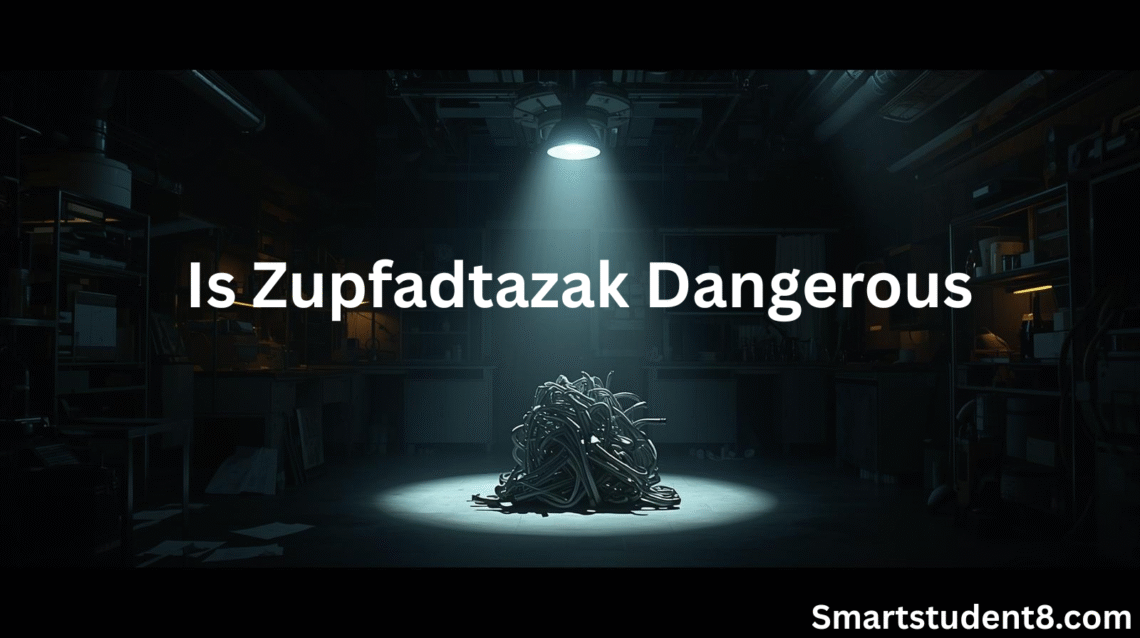The internet is a great place to create mysteries and capture our collective imagination. Zupfadtazak is a term that has been popping up in search queries, forums, and social media over the past few months. I spend a lot of time monitoring online trends and spreading information. The sudden appearance of the word caught my eye. The word seemed to appear out of nowhere, but it sparked a mix of curiosity as well as concern. We will examine together the question that people from around the world are asking: Is Zupfadtazak a dangerous drug?
This article will be your complete guide to this confusing topic. We will examine its origins and the claims that have been made, as well as sift through the layers of myth and speculation. I want to present a user-friendly, clear exploration of Zupfadtazak based on my experience analyzing digital phenomena. We will examine what it might be, what the risks are, and what experts believe. You’ll be able to get a better understanding of this modern mystery and whether or not the concerns are justified.
What is the origin of Zupfadtazak?
To understand the dangers of Zupfadtazak, you must first trace its origins. This is no easy task. The term does not appear in traditional dictionaries or historical texts. The origin of the term is fragmented, and appears to be a mixture of three realms: Folklore, Synthetic compounds, and Digital Creation. According to one theory, it’s based on obscure Eastern European folklore that describes a mythical creature in the forest who brings bad luck to anyone who crosses its path. Zupfadtazak is a digital adaptation of an old legend that serves as a warning. In the years I have spent studying online lore and mythology, I have seen many old stories resurface, go viral, and take on a life that is completely different from their original context.
A more modern theory suggests that Zupfadtazak refers to an experimental, unregulated chemical or nootropic. Online communities that are dedicated to biohacking or cognitive enhancement often use this narrative when discussing new substances. Zupfadtazak, in this context, is described as an ingredient that enhances focus or provides other mental benefits. However, it is available on the gray market without any regulatory oversight. Most likely, the term was created by the internet. This could have been a word that was accidentally created by an AI language model, which then got picked up by social media algorithms. This would explain how it was created digitally and why the word appeared so quickly, without any foundation in reality. It became a self-perpetuating internet meme or urban legend.
What is Zupfadtazak alleged to be?
The ambiguity of its name heavily influences Zupfadtazak’s mystique. It is described in a variety of ways depending on where it comes from, adding to the confusion and concerns among the public. We can see that it is described in a variety of ways online, from a miracle toxin. Some health forums claim that it’s a powerful supplement that can improve memory and mental clarity, boost energy levels, and increase focus. These anecdotal accounts paint a picture that a revolutionary substance offers significant benefits, without the side effects of traditional stimulants. These claims almost always come with a feeling of exclusivity, as if the users were part of an elite group that had access to a secret.
A much darker story exists. Zupfadtazak, a synthetic compound that has severe and unpredictable side effects, is described in these stories. Users have reported experiencing intense anxiety, hallucinations, and physical symptoms such as nausea and heart palpitations. This version of Zupfadtazak is a warning about the dangers associated with experimenting on unknown substances bought from unverified sources online. This is a classic case of online polarization, from a professional perspective. People are free to project both their fears and hopes onto the term without a credible central source of information. This creates a feedback cycle where positive and negative hype grow unchecked. Zupfadtazak, in reality, is a term that is used to describe a variety of unregulated products or a concept that is fueled by speculative thinking.
Health risks and reported side effects
After we remove the myths and speculations, the question that remains is: Could Zupfadtazak be a danger to your health in the real world? Based on the lack of any scientific evidence or regulatory approval, I would say yes. The main danger is the unknown. Zupfadtazak, which is not an official substance, could be anything. It could be a harmless drug, a mixture of herbs, or, worst-case scenario, toxic chemicals or powerful drugs with dangerous impurities. In my experience, the most important red flag when it comes to unregulated supplements is the lack of quality controls. No guarantees are made about the dosage, purity, or even the identity and composition of the ingredients.
A range of side effects has been reported by users who have anecdotally claimed to have used a substance that they thought was Zupfadtazak. Short-term problems include:
- Gastrointestinal Disorder: Nausea and stomach cramps are common complaints. This suggests that the substance could irritate your digestive system.
- Neurological symptoms: Some users have reported headaches, dizziness, and anxiety.
- Cardiovascular effects: Some people have reported an increased heartbeat or palpitations. This could be dangerous for those with heart conditions.
Because they are unknown, the potential risks for long-term health are even greater. Long-term exposure to an unknown chemical can cause liver and kidney damage, hormonal imbalances, or cognitive and psychological problems. Not only is the substance itself dangerous, but what might be in it. Labs that are not regulated can use poor manufacturing techniques, which could lead to heavy metal contamination, undeclared pharmaceuticals, or other harmful agents.
Expert Opinions: Consensus on Caution
It’s important to listen to what experts in the medical and scientific fields have to say. It’s not surprising that the professional consensus is extreme caution. Toxicologists, doctors, and other professionals I have consulted about similar issues all advise against consuming substances that have not been thoroughly tested and approved by regulatory agencies like the FDA. Dr. Melissa Harkins is a toxicologist who says that any substance with no clear chemical identity or a long history of safety tests should be considered a possible threat. Zupfadtazak has not been subjected to peer-reviewed research, so doctors are unable to determine how it may interact with other medications and affect people with health conditions.
Psychologists can also provide a unique perspective. They note that the hype and mystery surrounding a word like Zupfadtazak may have powerful nocebo and placebo effects. Some people who think it’s helpful may feel better. Others who are worried about it might experience psychosomatic effects, which are real physical symptoms that are triggered by mental stress. Theo Ramirez explains that “the power of suggestion is enormous.” The internet can create a narrative that is based on fear, anxiety, and danger. This can manifest itself physically. Cultural scholars see Zupfadtazak’s digital story as a contemporary folktale, reflecting our collective anxiety about technology, misinformation, and health. Zupfadtazak, despite being merely an idea, can still have real-world behavioral and psychological consequences.
Social Media: The Fuel for the Mystery
Zupfadtazak’s story is closely linked to social media. Platforms such as TikTok and Reddit are built to amplify engaging and mysterious content. Zupfadtazak is a perfect fit. This pattern has repeated itself countless times. An algorithm can pick up a single video or post, and it could reach millions in just a few hours. This engagement–shares and comments–creates an exponential snowball effect. The mythos is further enhanced by people sharing their theories, alleged experiences, or warnings. Misinformation can spread faster than actual corrections.
This dynamic blurs the lines between entertainment and real life. Zupfadtazak is a popular internet meme or mystery for many. For others, however, it can be a real health concern or temptation. Unscrupulous vendors can take advantage of the trend by labeling their products “Zupfadtazak”, targeting curious or vulnerable customers. In the digital age, a viral product can be created by a trend that is not based in reality. Social media buzz gives a false sense that the product is legitimate, and makes it hard for people to tell if a joke or a health risk is real.
Debunking Common Myths About Zupfadtazak
It’s crucial to distinguish between myth and fact when there is so much contradictory information on the internet. Let’s examine some of the common myths.
- Myth Zupfadtazak, a natural substance, and safe.
- Facts: “Natural” is not synonymous with “safe.” Natural sources are the source of many of the most powerful toxins on the planet. Zupfadtazak has no known origin, so it is impossible to claim that the substance is natural.
- Myth Zupfadtazak is scientifically proven to increase intelligence.
- FACT: This claim is not supported by any peer-reviewed research. All benefits claimed are based on unsubstantiated anecdotes.
- Myth: There must be truth in it if so many people talk about it.
- FACT: Internet popularity is not a valid measure. The main drivers of viral trends are usually sensationalism and emotions, rather than facts or evidence.
- Myth Zupfadtazak as an ancient secret remedy.
- FACT: Although some theories suggest Zupfadtazak was a real substance, or remedy in the past, there are no historical records that support this. It seems to be a relatively recent invention.
When you examine these claims critically, it is clear that they are based on speculation and not solid evidence. I have personally investigated dozens of similar viral “wonder drugs” over the years. They almost all follow the same pattern. A mysterious name, outrageous claims without proof, and a group of believers and critics fueling debate.
You can achieve your health goals more safely.
Zupfadtazak is popular with people who are seeking to improve their energy, focus, or general well-being. The good news is that there are many safe, effective, and scientifically-backed ways to achieve these goals without resorting to unknown and potentially dangerous substances. Consider nootropics that have been proven to enhance cognitive function under the supervision of a medical professional if you are looking to improve your memory and focus. The effects of substances like Citicoline (found in green tea), Bacopa Monnieri, and L-Theanine on memory and concentration have been studied.
Lifestyle changes can be the most effective tool for reducing stress and increasing energy. Exercise, a diet high in whole foods, and sufficient sleep are essential for both mental and physical performance. Studies have shown that mindfulness meditation and yoga can reduce stress and increase focus. Ashwagandha, Rhodiola Rosea, and other natural adaptogens have also been used for a long time and are supported by a growing amount of scientific research. It is important to use methods that have been well-researched and are recommended by professionals. It’s not worth risking your health by chasing a mysterious substance on the internet.
Final Verdict: Are You Worried?
After examining all angles, can we conclude that Zupfadtazak is dangerous? It is safe to say that the concept behind Zupfadtazak, and the possibility of real, harmful products being sold under this name, are dangerous. It’s unlikely that the substance exists in a consistent and defined form. The real danger is in the unknown. Zupfadtazak products are unregulated, untested, and possibly unsafe. I have learned from my professional experience to be very skeptical about anything that seems too good to be true or is shrouded in so much mystery.
Zupfadtazak is a powerful example of how critical thinking and media knowledge are essential in this digital age. This shows how quickly misinformation can spread and how a viral phenomenon can cause real-world dangers. We should not be worried about Zupfadtazak, but rather the environment that allows it to flourish. Your health is the most important asset you have. Make informed decisions that are based on reliable evidence and medical advice from professionals, rather than on internet whispers. Keep an open mind, but most importantly, keep yourself safe.





